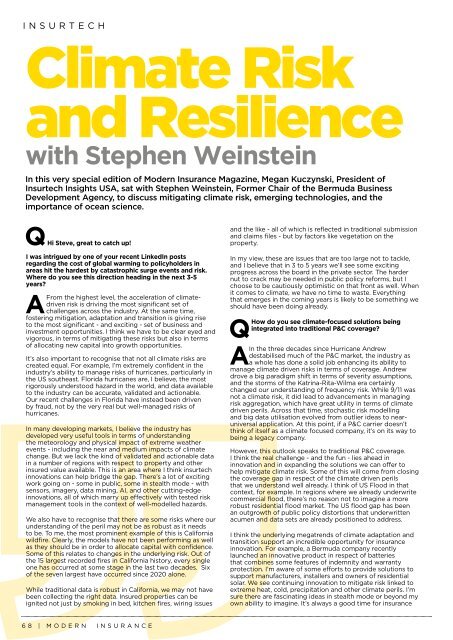Modern Insurance Magazine Issue 60
This issue features... Insight: Every Cloud Has A Silver Lining, by Tim Yeates, Co-Founder, Carbon1 Ltd. Interview: Modelling Modern Risk with Dr Kirsten Mitchell-Wallace, Director of Portfolio Risk Management, Lloyd’s of London Interview: Searching for Answers with Iain Willis, Research Director, Gallagher Research Centre Editorial Board: Find out what our editorial board panel of experts have to say in this edition of Modern Insurance Magazine A Final Word with Steve White, Chief Executive, British Insurance Brokers' Association (BIBA) Is it time for Risk Managers to rethink their role in the Climate Crisis? by François Lanavère, Head of Strategic Partnerships, AXA Climate Associations Assemble: Modern Insurance’s panel of resident associations outline the burning issues in insurance Just a Thought with Eddie Longworth - Building Trust through Responsible AI in Claims: Championing a Voluntary Code of Conduct Making Efficiency Gains in Subsidence Claims, by Chris Carlton MRICS, New Business & Key Account Director, Geobear Chemistry for a Sustainable Future: Q&A with Grant Dempsey, Sales Manager - Distribution, BASF Automotive Refinish UK & Ireland Industry Collaboration: Working together to provide the best mobility solution, with James Roberts, Business Development Director, Insurance, Europcar Mobility Group UK Thinking Upside Down: Mind the Protection Gap, by Ashley Preece, Product Owner, Claim Technology In Conversation with… Neil Garrett, UK, South Africa & Nordics Sales Director, Solera | Audatex A New Climate for Claims, from I Love Claims / ARC 360 10 Mins with… Ola Jacob, Independent Insurance Advisor In Celebration: Modern Claims Awards 2023 Insur.Tech.Talk - Interviews with Stephen Weinstein, Former Chair of the Bermuda Business Development Agency; Bill Churney, President, Extreme Event Solutions, Verisk; Jacqui LeGrand, CEO, Maptycs; Heather H. Wilson, Chief Executive Officer, CLARA Analytics Insur.Tech.Talk Editorial Board - Experts from within the insurtech sector and beyond join us once more to share their unique insights!
This issue features...
Insight: Every Cloud Has A Silver Lining, by Tim Yeates, Co-Founder, Carbon1 Ltd.
Interview: Modelling Modern Risk with Dr Kirsten Mitchell-Wallace, Director of Portfolio Risk Management, Lloyd’s of London
Interview: Searching for Answers with Iain Willis, Research Director, Gallagher Research Centre
Editorial Board: Find out what our editorial board panel of experts have to say in this edition of Modern Insurance Magazine
A Final Word with Steve White, Chief Executive, British Insurance Brokers' Association (BIBA)
Is it time for Risk Managers to rethink their role in the Climate Crisis? by François Lanavère, Head of Strategic Partnerships, AXA Climate
Associations Assemble: Modern Insurance’s panel of resident associations outline the burning issues in insurance
Just a Thought with Eddie Longworth - Building Trust through Responsible AI in Claims: Championing a Voluntary Code of Conduct
Making Efficiency Gains in Subsidence Claims, by Chris Carlton MRICS, New Business & Key Account Director, Geobear
Chemistry for a Sustainable Future: Q&A with Grant Dempsey, Sales Manager - Distribution, BASF Automotive Refinish UK & Ireland
Industry Collaboration: Working together to provide the best mobility solution, with James Roberts, Business Development Director, Insurance, Europcar Mobility Group UK
Thinking Upside Down: Mind the Protection Gap, by Ashley Preece, Product Owner, Claim Technology
In Conversation with… Neil Garrett, UK, South Africa & Nordics Sales Director, Solera | Audatex
A New Climate for Claims, from I Love Claims / ARC 360
10 Mins with… Ola Jacob, Independent Insurance Advisor
In Celebration: Modern Claims Awards 2023
Insur.Tech.Talk - Interviews with Stephen Weinstein, Former Chair of the Bermuda Business Development Agency; Bill Churney, President, Extreme Event Solutions, Verisk; Jacqui LeGrand, CEO, Maptycs; Heather H. Wilson, Chief Executive Officer, CLARA Analytics
Insur.Tech.Talk Editorial Board - Experts from within the insurtech sector and beyond join us once more to share their unique insights!
Create successful ePaper yourself
Turn your PDF publications into a flip-book with our unique Google optimized e-Paper software.
INSURTECH<br />
Climate Risk<br />
and Resilience<br />
with Stephen Weinstein<br />
In this very special edition of <strong>Modern</strong> <strong>Insurance</strong> <strong>Magazine</strong>, Megan Kuczynski, President of<br />
Insurtech Insights USA, sat with Stephen Weinstein, Former Chair of the Bermuda Business<br />
Development Agency, to discuss mitigating climate risk, emerging technologies, and the<br />
importance of ocean science.<br />
Q Hi Steve, great to catch up!<br />
I was intrigued by one of your recent LinkedIn posts<br />
regarding the cost of global warming to policyholders in<br />
areas hit the hardest by catastrophic surge events and risk.<br />
Where do you see this direction heading in the next 3-5<br />
years?<br />
A<br />
From the highest level, the acceleration of climatedriven<br />
risk is driving the most significant set of<br />
challenges across the industry. At the same time,<br />
fostering mitigation, adaptation and transition is giving rise<br />
to the most significant - and exciting - set of business and<br />
investment opportunities. I think we have to be clear eyed and<br />
vigorous, in terms of mitigating these risks but also in terms<br />
of allocating new capital into growth opportunities.<br />
It’s also important to recognise that not all climate risks are<br />
created equal. For example, I’m extremely confident in the<br />
industry’s ability to manage risks of hurricanes, particularly in<br />
the US southeast. Florida hurricanes are, I believe, the most<br />
rigorously understood hazard in the world, and data available<br />
to the industry can be accurate, validated and actionable.<br />
Our recent challenges in Florida have instead been driven<br />
by fraud, not by the very real but well-managed risks of<br />
hurricanes.<br />
In many developing markets, I believe the industry has<br />
developed very useful tools in terms of understanding<br />
the meteorology and physical impact of extreme weather<br />
events - including the near and medium impacts of climate<br />
change. But we lack the kind of validated and actionable data<br />
in a number of regions with respect to property and other<br />
insured value available. This is an area where I think insurtech<br />
innovations can help bridge the gap. There’s a lot of exciting<br />
work going on - some in public, some in stealth mode - with<br />
sensors, imagery, data mining, AI, and other cutting-edge<br />
innovations, all of which marry up effectively with tested risk<br />
management tools in the context of well-modelled hazards.<br />
We also have to recognise that there are some risks where our<br />
understanding of the peril may not be as robust as it needs<br />
to be. To me, the most prominent example of this is California<br />
wildfire. Clearly, the models have not been performing as well<br />
as they should be in order to allocate capital with confidence.<br />
Some of this relates to changes in the underlying risk. Out of<br />
the 15 largest recorded fires in California history, every single<br />
one has occurred at some stage in the last two decades. Six<br />
of the seven largest have occurred since 2020 alone.<br />
While traditional data is robust in California, we may not have<br />
been collecting the right data. Insured properties can be<br />
ignited not just by smoking in bed, kitchen fires, wiring issues<br />
and the like - all of which is reflected in traditional submission<br />
and claims files - but by factors like vegetation on the<br />
property.<br />
In my view, these are issues that are too large not to tackle,<br />
and I believe that in 3 to 5 years we’ll see some exciting<br />
progress across the board in the private sector. The harder<br />
nut to crack may be needed in public policy reforms, but I<br />
choose to be cautiously optimistic on that front as well. When<br />
it comes to climate, we have no time to waste. Everything<br />
that emerges in the coming years is likely to be something we<br />
should have been doing already.<br />
How do you see climate-focused solutions being<br />
integrated into traditional P&C coverage?<br />
Q<br />
In the three decades since Hurricane Andrew<br />
destabilised much of the P&C market, the industry as<br />
A a whole has done a solid job enhancing its ability to<br />
manage climate driven risks in terms of coverage. Andrew<br />
drove a big paradigm shift in terms of severity assumptions,<br />
and the storms of the Katrina-Rita-Wilma era certainly<br />
changed our understanding of frequency risk. While 9/11 was<br />
not a climate risk, it did lead to advancements in managing<br />
risk aggregation, which have great utility in terms of climate<br />
driven perils. Across that time, stochastic risk modelling<br />
and big data utilisation evolved from outlier ideas to nearuniversal<br />
application. At this point, if a P&C carrier doesn’t<br />
think of itself as a climate focused company, it’s on its way to<br />
being a legacy company.<br />
However, this outlook speaks to traditional P&C coverage.<br />
I think the real challenge - and the fun - lies ahead in<br />
innovation and in expanding the solutions we can offer to<br />
help mitigate climate risk. Some of this will come from closing<br />
the coverage gap in respect of the climate driven perils<br />
that we understand well already. I think of US Flood in that<br />
context, for example. In regions where we already underwrite<br />
commercial flood, there’s no reason not to imagine a more<br />
robust residential flood market. The US flood gap has been<br />
an outgrowth of public policy distortions that underwritten<br />
acumen and data sets are already positioned to address.<br />
I think the underlying megatrends of climate adaptation and<br />
transition support an incredible opportunity for insurance<br />
innovation. For example, a Bermuda company recently<br />
launched an innovative product in respect of batteries<br />
that combines some features of indemnity and warranty<br />
protection. I’m aware of some efforts to provide solutions to<br />
support manufacturers, installers and owners of residential<br />
solar. We see continuing innovation to mitigate risk linked to<br />
extreme heat, cold, precipitation and other climate perils. I’m<br />
sure there are fascinating ideas in stealth mode or beyond my<br />
own ability to imagine. It’s always a good time for insurance<br />
68 | MODERN INSURANCE

















